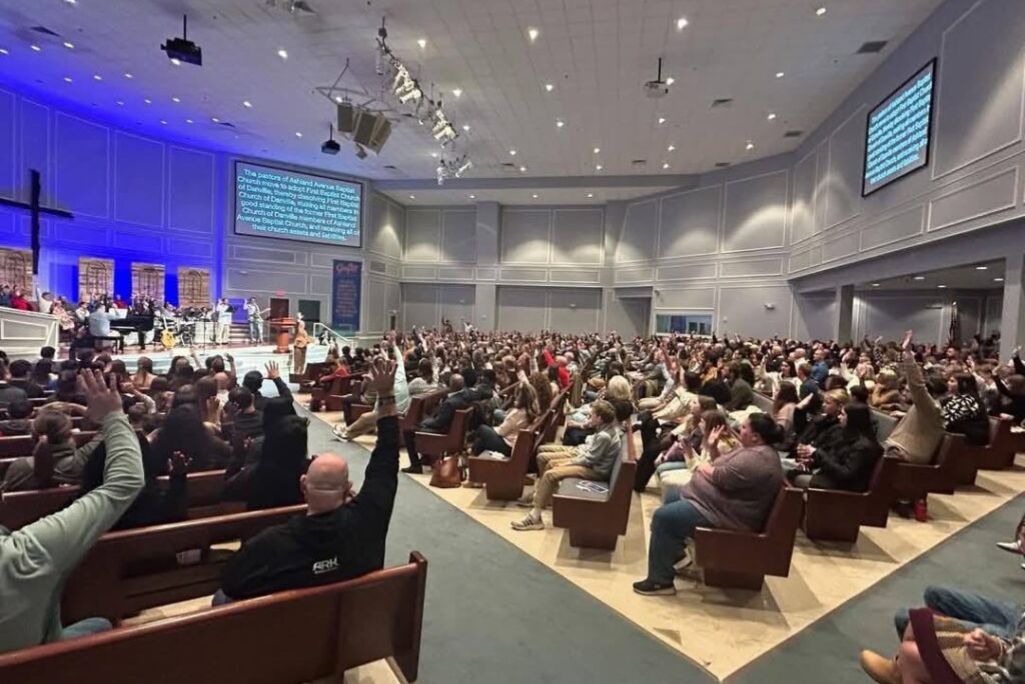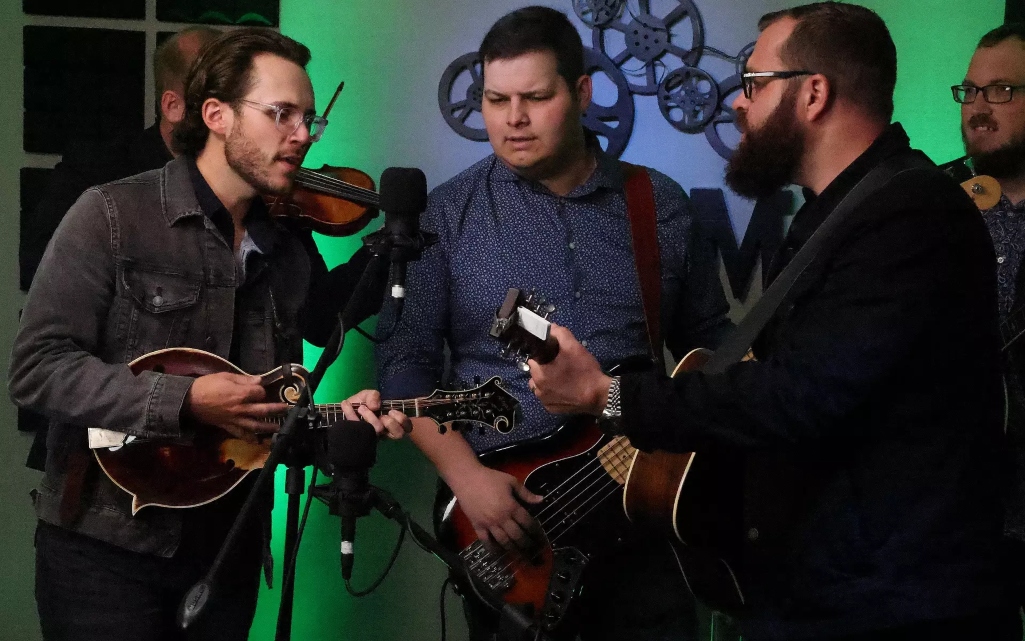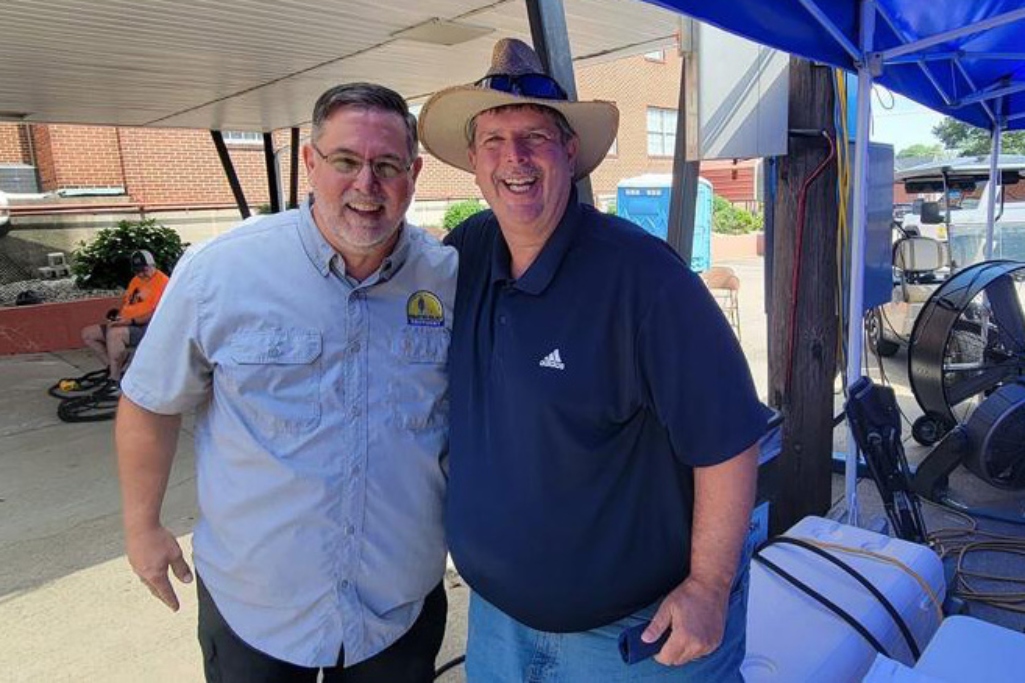
Members of Ashland Avenue Baptist Church in Lexington, Ky., vote on Jan. 26 to adopt First Baptist in Danville.
DANVILLE, Ky. (BP) — Signs emerge when a church is in trouble. Memberships and baptisms dip. The sounds of youth and children barely, if ever, echo through the halls. Building maintenance is deferred for longer periods of time.
Within a church’s temptation to live in the past, the signs lead to anxiety-ridden questions about the future.
Over the last 11 years, the Central Kentucky Network of Baptists (CKNB) has worked with dozens of churches through its Barnabas Team, which develops tools to assess church health and chart a path forward that may include revitalization and replanting.
CKNB Executive Director David Stokes agreed in December 2023 to serve as First Baptist Danville’s transition pastor under conditions that included an assessment.
“The results were that First Baptist would need to surrender control to a healthy church for a season of three to five years to regain focus, identify and equip new leadership and engage their community with the gospel,” Stokes said.
Responsibility for the next step was placed back on First Baptist Danville — research options for a church partner and bring a recommendation.
The recommendation came in December to join the process of church “adoption” practiced by Ashland Avenue Baptist Church in Lexington. Both churches agreed in votes last month.
Ashland Avenue’s method focuses on making a church self-sustaining and reproducible. The process takes years but has already brought new life and identity to other churches.
“First Danville becomes part of Ashland, such that we would never say there’s Danville and Ashland,” said Todd Martin, who will transition from being Ashland Avenue’s college and missions pastor to becoming pastor in Danville. “We would just say there’s Ashland, and some of us live in Danville and some of us live in Lexington.
“We will, for a number of years, be one church gathering in two cities, all looking forward to the day in which we launch Danville as a sister, thriving, autonomous church.”
Although many changes will come, they won’t alter First Baptist’s history and commitment to the gospel. Lottie Moon was a member there from 1868-71, for instance, and taught at a women’s school before serving in China.
David Barron, CKBN associate executive director, heaped credit on the First Baptist Danville task force that worked through the assessment.
“These men and women did the real heavy lifting, and without their tireless efforts in seeking God’s will for Danville and a commitment to stay the course even in difficult situations, this adoption probably would not have happened,” he said.
The CKBN’s Barnabas Team that worked alongside them consisted of Stokes and Barron as well as Steve Bruce, pastor of Crosswoods Baptist Church in Nicholasville; CJ Pearce, pastor of White Sulphur Baptist in Georgetown; and Derek Holmes, pastor of Living Hope Fellowship in Lexington.
“It’s about cooperation, not competition, for the kingdom,” Barron said. “Anytime a church is brought back to health, we all win.”
The Kentucky Baptist Convention (KBC) will be involved in the process to provide support in various ways, said KBC Church Planting Strategist Brian Horton.
Horton worked as part of the convention’s evangelism team that assisted in determining future steps for church replanting. He began his current role, a new one for the KBC, on Jan.1.
“I’m convinced that replanting needs to be a priority for every association and state convention,” he said.
“In my role, I am attempting to normalize the conversation in the state, communicating that to be in decline does not have to be the end of the story. I want to provide churches with hope that they can regain a healthy, thriving gospel presence in their community. I want to identify and encourage replant pastors, partner churches and associations that will engage in this mission.”
Ideally, he added, a church in decline recognizes its situation about three years before closing its doors. Members approach their association, state convention or a church with a history of successful replant partnerships for help. It could take up to a year and a half for spiritual preparedness, legal matters and other aspects to be worked through.
Association and state leaders can guide a church through making the final decision. But that decision ultimately rests with the congregation.
“As Southern Baptists, we place high value on autonomy, so the declining church must make the call,” Horton said.
Martin preached his first sermon as campus pastor of Ashland in Danville Feb. 2. Plans are for him to move to Danville, about an hour south of Lexington, by early summer.
David Prince, Ashland Avenue pastor of preaching and vision, called the effort “part of our obedience to the Great Commission. We plan to continue to adopt churches to replant as God provides opportunity until Jesus returns.”
Healthy, thriving churches, Martin added, “are central to God’s purposes in the world and the story of His kingdom. It is glorifying to Him, a display of His victory, when churches are being planted, replanted and thriving.”
(EDITOR’S NOTE — Scott Barkley is chief national correspondent for Baptist Press.)


